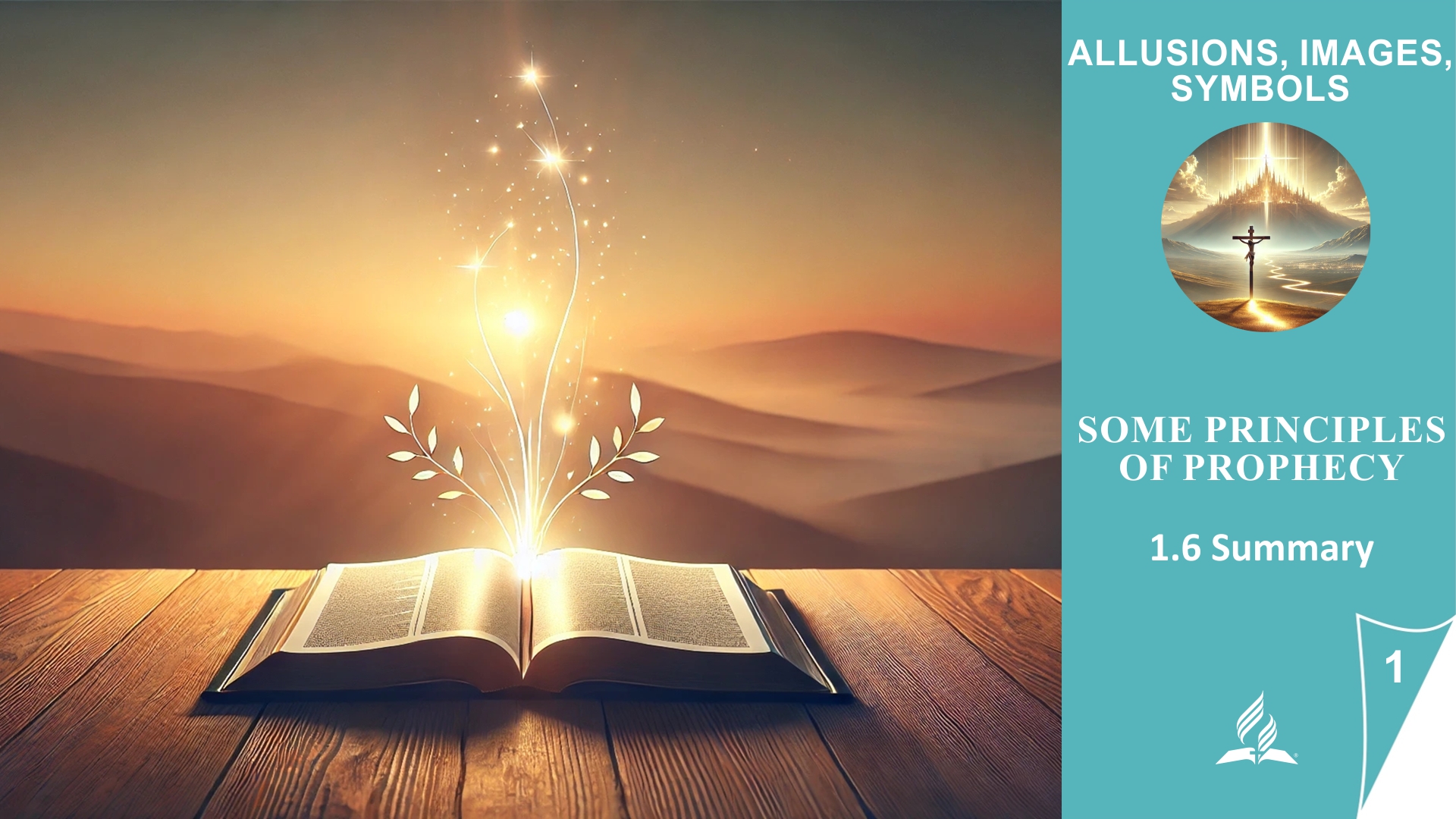


📘 Lesson 1 – Some Principles of Prophecy
1.6 Summary
Foundations for a Clear Understanding of Biblical Prophecy
🟦 Introduction – Orientation in the Fog of Opinions
The Bible is a book like no other. Especially in the realm of prophecy, we encounter a wide variety of opinions:
The Antichrist – symbol or real person?
Daniel – for back then or for today?
What is literal, what is symbolic?
This diversity can be confusing – or challenging.
Because God invites us not to give up, but to ask more deeply:
📖 “Let the one who reads understand!” (Matthew 24:15)
📖 Bible Study – The 5 Principles of Prophetic Understanding
📌 1. Attention & Humility in Reading (1.1 Let the one who reads understand!)
Principle: Prophecy requires an open, listening heart.
The Bible is not open to random interpretation – God wants us to listen and understand. It’s not just about intellect, but about our inner attitude. (cf. Revelation 1:3)
📌 2. God Desires to Be Understood (1.2 God Wants to Be Understood)
Principle: God does not speak to confuse, but to reveal.
Even if we don’t understand everything, God gives clarity on what matters most for our salvation. (Isaiah 55:9; 2 Timothy 3:15–17)
📌 3. The Unfolding of Knowledge Over Time (1.3 Daniel: Seal the Words)
Principle: Some prophetic truths were reserved for the time of the end.
Understanding grows – like in the book of Daniel – according to God’s set timing. Knowledge is a gift that grows with spiritual maturity. (cf. Daniel 12:4)
📌 4. The Whole Bible Speaks (1.4 Studying the Word)
Principle: Scripture interprets itself.
Single verses should not be taken out of context. We must compare Scripture with Scripture to see the full picture – especially in prophecy. (Luke 24:27)
📌 5. Symbolic or Literal? (1.5 Figurative or Literal)
Principle: The Bible explains its own symbols.
We must not interpret prophetic images through modern lenses (e.g., bear = Russia), but examine how the symbol is used throughout the Bible.
✨ Spiritual Principles – How God Makes Prophecy Accessible
-
Humility before truth is more important than pride in knowledge.
-
The Holy Spirit leads us step by step – in peace, not panic.
-
True prophecy is centered on Christ – not driven by speculation.
-
The Bible is a whole – not a random collection of quotes.
🧭 Application in Daily Life – Living Prophecy, Not Just Reading It
-
Read the Bible as a learner, not as a critic.
-
Don’t just ask, “What do I like?” – but “What is God really saying?”
-
Trust what is clear – and be patient with what is still hidden.
-
Part of prophetic understanding is speaking with love, not arrogance.
-
Prophecy is meant to encourage, not to frighten – Jesus is coming again.
✅ Conclusion – Prophecy Is an Invitation, Not a Maze
God wants to speak – not to overwhelm us, but to give us hope.
Prophecy is not a secret code – it’s a love letter in images.
And all those images lead to one person:
👉 Jesus – the Redeemer, the Judge, the Coming King.
💬 Thought of the Day
The Bible is not a book of darkness – but a lamp on our path. Whoever reads it with an open heart will be guided.
✍️ Illustration – The Conversation by the Window
Leipzig. A rainy Thursday.
Lina, 31, sat on the windowsill with a hot cup of tea. Beside her: an open notebook, a well-worn Bible – and a question in her mind:
“Can I even understand prophecy?”
Her colleague Daniel, a quiet guy with a passion for history, leaned in the doorway.
“Daniel again?”
She smiled. “Yes. I read yesterday that Daniel was told to seal up his vision – and that it would be understood at the end.”
Daniel stepped closer. “Do you think we’re living in the end?”
Lina shrugged.
“I just know that things suddenly make sense. Prophecies that once seemed cryptic now point clearly.”
He looked at the Bible. “So what’s the goal of all this prophecy? The end of the world? Fear?”
She turned to Revelation 1:1.
“No. Jesus. It says: ‘The Revelation of Jesus Christ.’ Everything points to Him.”
Daniel was silent.
“So… it’s not about decoding everything…”
“…but about recognizing Him,” she finished the sentence.
Rain tapped against the window. Silence for a moment.
Then Daniel said softly:
“Maybe I should start reading too. Not TikTok shorts. Just… really read.”
Lina handed him her second Bible.
“Just start. Maybe with Daniel 2. Or Revelation 1.”
He took it.
“I’ll start where you said: with Jesus.”
📖 “The Revelation of Jesus Christ…” (Revelation 1:1)




















